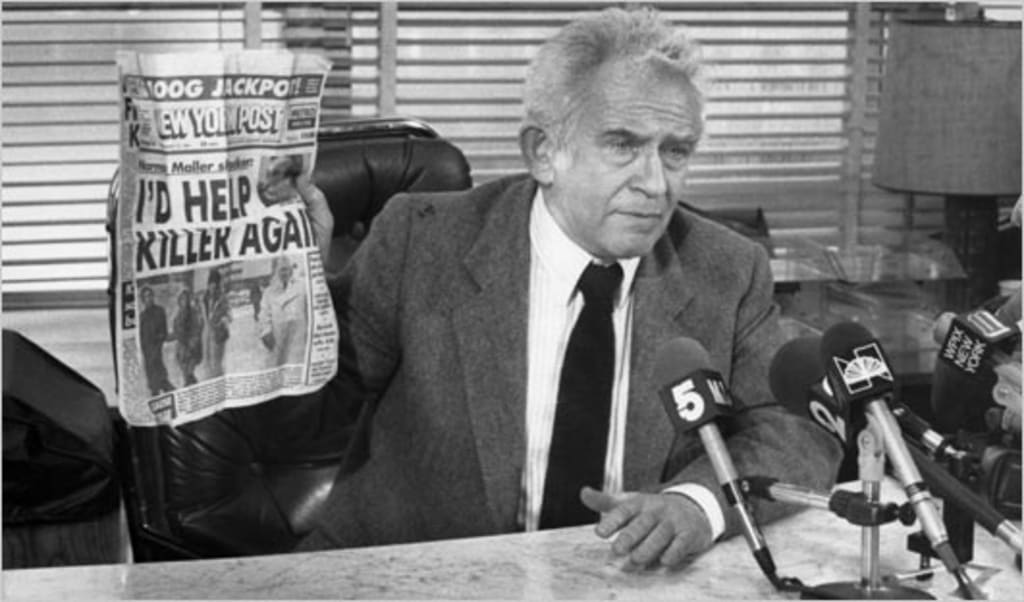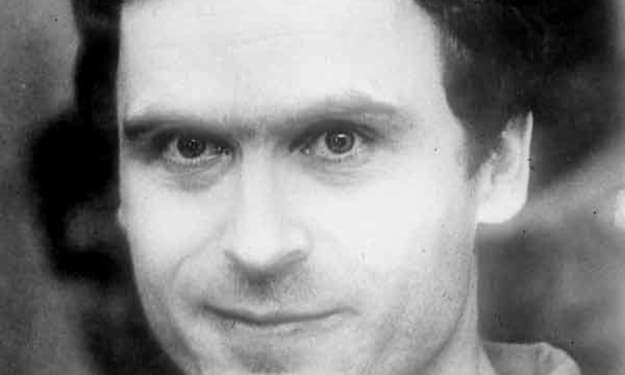Norman Mailer, Jack Henry Abbott and the Pesky Beast Belly
Why did Jack Henry Abbott throw his life away?

In addition to being a Pulitzer Prize-winning author, Norman Mailer was an attempted murderer who used a a penknife to stab his wife, Adele Morales, in 1960. This resulted in him being involuntarily committed to Bellevue Hospital for 17 days, and also three-years' probation. In other words, he had a criminal history. This may be why he empathized with Jack Henry Abbott. Mailer helped publish Abbott's 1981 memoir, In the Belly of the Beast, collected from their correspondences as Abbott served time. Though Abbott had been found guilty of forgery, bank robbery and murdering another inmate, Mailer thought he had potential as a great writer. As it turned out, In the Belly of the Beast would make Abbott a one-hit wonder. Not only was his followup sort of a flop, but Abbott foolishly threw it all away not long after being freed in June of 81.
The very next month, Abbott murdered Richard Adan, a 22-year-old waiter, actor, and playwright. Why? Instead of letting Abbott use the employee's restroom in a cafe, Adan made him urinate outside. For this perceived rudeness a life was lost. Mailer would later recall his support of Abbott as "another episode in my life in which I can find nothing to cheer about or nothing to take pride in."
There are, of course, some interesting questions here. The most obvious: Why on earth would Jack Henry Abbott kill again, especially when he was clearly on the path to being a successful career author. Sure, he could not legally profit from his memoir, and he would have been a controversial figure. However, successful future works would not have been out of the question... or were they?
"State Raised Convict"
We could examine the "what-ifs" of such a case forever, but Abbott considered himself a "state raised convict," whose school was prison. He had been in trouble with the law since age 12, making the four walls of a cell his standard classroom, and learning was defined along those lines. Not only was he an "institutional man" (to borrow the language from Shawshank Redemption) but he no doubt romanticized the criminal/macho element of prison life as well. If you take even a cursory glimpse at prison culture, you can easily see an element of mythologizing. This is perpetuated by the idea that one must be tough in order to make it, both inside and outside of prison.
While modern parlance would (laughably) simplify this as "toxic masculinity," it could actually be broadened well beyond those narrow confines, and seen as part of the generalized human condition. While most of us seek (and often enough find) love and companionship, there is a whole other side of the coin of human experience. Abbott most certainly spent that coin every chance he got, so to speak, because it purchased him the luxury he was most familiar with: Himself.
Self-aggrandizement and self-mythology are powerful motivators in this world, and (at least partly) stem from one's desire to feel invulnerable/free from harm. It's more complicated, though, as such a person will no doubt also identify with harm, feel validated by it—including self harm and self-deprecation. It's odd, too, in Abbott's case, as his reality blended with the pathos of his book. For example, a quote like "I find it painful and angering to look in a mirror" is likely both true AND a device to win over his audience (initially just Mailer, then anyone who read the compiled memoir).
"The White Negro" and More; Did Norman Mailer Thrive on Controversy?
Norman Mailer was a bit out there himself, which surely fed his appeal (similar to Hunter S. Thompson). In addition to the aforementioned (and seemingly random) murder attempt on his wife, Mailer had some unrequited political ambitions. When he ran in the Democratic primaries for Mayor of New York City in 1969, he wanted New York City to secede from the state. Why? According to his son, John Buffalo Mailer: "[Norman Mailer] foresaw the city, its independence secured, splintering into townships and neighborhoods, with their own school systems, police departments, housing programs, and governing philosophies. In some areas, church attendance might be obligatory, in others free love mandatory..." As interesting as the idea was, it didn't exactly catch on, and Norman didn't win the primary.
If John Buffalo Mailer's summary is accurate, it represents an almost aimless, "hands-off" approach to forging the future, which did appeal to certain people of different political persuasions. What's most interesting, though, is the sense of it being a deliberate gamble, like a roll of the proverbial dice. It seems to be yet another link in the chain of better understanding Mailer, and why he was drawn to people like Abbott. One could also read his essay, The White Negro, which is an impressively written yet bizarre essay about white "hipsters" blending with the ways of "the Negro."
Here's a sample of his rambling yet skilled style: "Knowing in the cells of his existence that life was war, nothing but war, the Negro (all exceptions admitted) could rarely afford the sophisticated inhibitions of civilization, and so he kept for his survival the art of the primitive, he lived in the enormous present, he subsisted for his Saturday night kicks, relinquishing the pleasures of the mind for the more obligatory pleasures of the body, and in his music he gave voice to the character and quality of his existence, to his rage and the infinite variations of joy, lust, languor, growl, cramp, pinch, scream and despair of his orgasm. For jazz is orgasm, it is the music of orgasm, good orgasm and bad, and so it spoke across a nation, it had the communication of art even where it was watered, perverted, corrupted, and almost killed, it spoke in no matter what laundered popular way of instantaneous existential states to which some whites could respond, it was indeed a communication by art because it said, 'I feel this, and now you do too.'”
Again, not badly written at all, but the essay rambles on and on. Almost by its very nature, it generates disagreement. Would it even be possible to agree with every little point in such broad generalizations as this? It seems there were too many rules without exceptions in those few sentences alone, right? Well, yet again, it hints at Mailer's need to romanticize crude aspects of life, and who could entirely blame him? Life is crude enough in even its mundane respects, so why not ramble on about it in a poetic manner, and why not hold a magnifying glass up to our own perceptions of it (and their shortcomings)?
Violence fits that category very much, as it is undeniably exciting (especially when paired with exciting sentences). Therefore, Mailer saw Abbott as a worthwhile project, regardless of actionable intent. Violent felons are interesting, are they not? It's even more fascinating if a criminal can write. It's goldmine of opportunity, though it can be squandered.
Final Thoughts: More Are Living ''In the Belly of the Beast''
With everything I've written here, it's easy to forget something: Neither Mailer nor Jack Henry Abbott wrote entirely for themselves, or of themselves. The "state raised convict" could be practically anyone locked away in any country on earth.
Then again, we can narrow it down to America, which is well known for having a huge prison population. A St. Catherine University paper presents a startling statistical snapshot, with lines like these: "[The] data suggests that about 84,000 individuals endure extreme conditions of isolation, sensory deprivation, and idleness in US correctional facilities...” and “from 1972 to 2012, the nation’s prison population grew by 706%.”
706% is nothing to sneeze at. It suggests either more violence in society or an overreaction to certain offences, or some combination of both. Meanwhile, solitary confinement (which is said to have impacted Jack Henry Abbott) increased, meaning more of America's inmates are suffering and being warped. As someone who's been in solitary confinement stated: "It leaves a scar on you that you won’t forget and you can’t heal … you get flashbacks and anxiety..."
As one who prides himself on attempting objectivity, what is to be gleaned from this practice? Is it wise? Does it rehabilitate damaged minds? Hell, we can even be shrewd here: Is it a good use of taxpayer money? To me it seems like it's just not effective in preventing violent behavior. In fact, it seems like it would only add to hatred (both self-hatred and societal hatred. However, what we can safely say about solitary confinement is that it's both cruel and selfish. It's advocated by people who believe a given criminal deserves it, and that it will inspire fear in others who (supposedly) will behave to avoid such punishments.
However, there are some plausible alternative reactions to such practices. It might make society look cruel, like no one gives a shit, and like society deserves the violence it receives. It will semi-justify criminals of all stripes, who can look at so-called "normal society" and see behavior no better than theirs. After all, the so-called “first rule of law enforcement” isn't "first, do no harm" (as it is for medical students). Instead, the first rule is "to go home at the end of every shift."
There's a different expectation there. A law enforcement officer seems to be trained to regard everyone and everything as a potential threat. It leads to a classic "chicken or the egg" debate, though, doesn't it? Was our society violent first, or did police and prisons help create a class of criminals? In this case, we might ask, was it the cage or the convict? When we stuff prisons full of people — cramming the non-violent with the violent — and they have to join racist gangs for protection, why expect positive outcomes?
Accordingly, a culture has been built around this "lifestyle" (and no, I don't just mean the whole "gangsta" thing, though that certainly exists). There are indeed people of all races with nothing to take pride in other than their rap sheet. Is that merely a "failure to adjust" for that person or also a reflection of something wrong with the world around them? Jack Henry Abbott said, “As long as I am nothing but a ghost of the civil dead, I can do nothing.” He may have thrown his life away, but did he have reason to do anything else?
Take good care of yourself, to the extent possible.
About the Creator
Wade Wainio
Wade Wainio writes stuff for Show Snob, Undead Walking, Pophorror.com, Vents Magazine and Haunted MTL. He is also an artist, musician and college radio DJ for WMTU 91.9 FM Houghton.






Comments
There are no comments for this story
Be the first to respond and start the conversation.